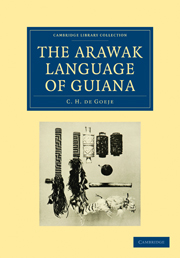Book contents
- Frontmatter
- Preface
- Contents
- List of literature
- Rules for pronunciation and abbreviations
- Alphabetical Index
- German words in Schultz' texts
- CHAPTER I Finite verb
- CHAPTER II Character of the Arawak words
- CHAPTER III Infinite verb
- CHAPTER IV Auxiliary verb a
- CHAPTER V Intensives, conjunctions, etc.
- CHAPTER VI K; B
- CHAPTER VII F; P; B
- CHAPTER VIII M
- CHAPTER IX N
- CHAPTER X D
- CHAPTER XI T
- CHAPTER XII Formation of verbs, etc.
- CHAPTER XIII L; R
- CHAPTER XIV H
- CHAPTER XV S
- CHAPTER XVI Vowels, diphotongs; colours
- CHAPTER XVII Classes of utterances; numerals
- CHAPTER XVIII Man
- CHAPTER XIX Foreign words. Arawak and Arawak-Maipure
- CHAPTER XX Origins of the Arawak language
- APPENDIX: Information collected in Surinam in 1907 and in 1928
- Frontmatter
- Preface
- Contents
- List of literature
- Rules for pronunciation and abbreviations
- Alphabetical Index
- German words in Schultz' texts
- CHAPTER I Finite verb
- CHAPTER II Character of the Arawak words
- CHAPTER III Infinite verb
- CHAPTER IV Auxiliary verb a
- CHAPTER V Intensives, conjunctions, etc.
- CHAPTER VI K; B
- CHAPTER VII F; P; B
- CHAPTER VIII M
- CHAPTER IX N
- CHAPTER X D
- CHAPTER XI T
- CHAPTER XII Formation of verbs, etc.
- CHAPTER XIII L; R
- CHAPTER XIV H
- CHAPTER XV S
- CHAPTER XVI Vowels, diphotongs; colours
- CHAPTER XVII Classes of utterances; numerals
- CHAPTER XVIII Man
- CHAPTER XIX Foreign words. Arawak and Arawak-Maipure
- CHAPTER XX Origins of the Arawak language
- APPENDIX: Information collected in Surinam in 1907 and in 1928
Summary
The k in Arawak implies activity; in contrast with this, the b is used to indicate “being at rest”. The way in which k is used often reminds one of “creation at work”, “the idea or the principle that becomes phenomenon”, b of “the manner in which that which has been created manifests itself, the appearance”.
G denotes the same as k, but is perhaps a degree milder (§5, forms 4; § 88 h).
It seems possible that the use of χ, kh (noted by G.), gk (used by some of the Moravians), k or g, is determined by the strength with which one wishes to express the k-principle. Moreover some influence probably comes from the other sounds of the word, and finally there may be personal differences in the speakers themselves and in those who wrote that down.
Bi; b appearance, i quick, light.
a) immediate past.
1) b-iki-bi kia ada iwi? … ama toho b-onyi bi? hast thou eaten of the (fruit of) the tree? … what is this that thou hast done? (Gen. III, 11, 13), ama l-onyi bi bu-mun? … d-ahaka bi ho-mun ibi, what did he to thee? … I have told you already (J. IX, 26, 27);
2) l-isiki bi ororoli d-akosi ajeago-ji, kena da-sogoso bi n, kena d-adika, he put clay upon mine eyes, and I washed, and do see, kidua-ni-ka Adaie-li akenako-n-wa, Simon o-mun l-iraiato bi, the Lord is risen indeed, and hath appeared to Simon, da-burite-sia ki da- buriti bi, what I have written, I have written, Adaie-li, b-onnaki faroka bi yaha rea i, Sir, if thou have borne him hence;
3) ibi, used in the same way as the auxiliary verb a.
- Type
- Chapter
- Information
- The Arawak Language of Guiana , pp. 98 - 109Publisher: Cambridge University PressPrint publication year: 2009First published in: 1928



